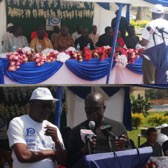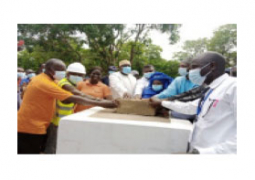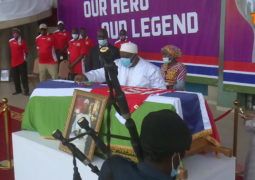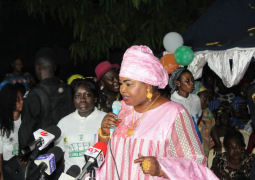
The WASCAL programme is a large-scale research-focused international climate service organisation established in 2012 in West Africa and designed to help tackle climate change challenges through research and capacity building and thereby enhance the resilience of human and environmental systems to climate change and increased variability.
It does so by strengthening the research infrastructure and capacity in West Africa related to climate change and by pooling the expertise of 11 West African countries and Germany. The programme is expected to graduates it first batch of PhD candidates this year.
The Doctoral Research Programme (DRP) on Climate Change and Education at University of The Gambia is set up as a regional capacity building effort with support from the “WASCAL initiative” funded by the German Federal Ministry of Education and Research (BMBF).
It is an autonomous programme hosted in the School of Agriculture and Environmental Sciences of University of The Gambia.
Part of the objectives of the WASCAL DRP on Climate Change and Education is to give support to West African universities to synergize their efforts on a regional basis and maximize their capabilities to improve the training in climate change and education for better overall results and increased benefits to West Africa.
The programme ultimately aims to strengthen the research, educational, and policy capacities and competencies of West African countries to deal with issues of climate change education in partnership with German institutions.
In his keynote address, UTG Vice Chancellor Professor Herbert Robinson described the WASCAL programme as “very impactful” for West Africa.
“Climate change is very disruptive to the environment, food security, causing drought, damage to human health; damage to our infrastructure and livelihood,” he said. “We have seen the devastating effects of climate change in many communities within Africa and in The Gambia. So doing nothing is not an option.”
“So that is why WASCAL came in. WASCAL was established in 2012 to tackle some of the major challenges we face as a nation or as a region.”
The UTG VC says the WASCAL programme is “very useful” but adds it’s a collaboration that involves 11 West African countries, making Gambia’s participation “very limited.”
“But alone side that; we also want to engage our development partners. I think all of them recognise Africa’s challenges, Africa’s dilemma; and we are able to persuade them that it’s important for them to invest in scholarship programmes so that we can have more students who can participate in Master’s programme as well as the PhD programme. So that’s what we intend to do it,” Prof. Robinson said as he harped on the need for robust partnership.
The UTG-WASCAL Director Professor Sidat Yaffa, while responding to questions from the press, said ECOWAS is a partner to the WASCAL programme, while outlining the structure of the WASCAL programme.
Prof. Yaffa explained that the Governing Board which consists of the members of all the 11 countries manages all the affairs of WASCAL. He added that the Ministerial Council is the highest body of WASCAL and it is expected to hold a meeting on 23 February 2023 in Berlin.
During the meeting, Prof. Yaffa disclosed, the four countries such as; Sierra Leone, Liberia, Guinea Bissau and Guinea Conakry who are yet to join the WASCAL programme will be encouraged to join so as to have all West African countries in the programme.
Dr. Mamma Sawaneh, the scientific coordinator of UTG-WASCAL Doctorate Research Programme on Climate Change and Education, gave an overview of UTG-WASCAL Doctorate Research Programme.




